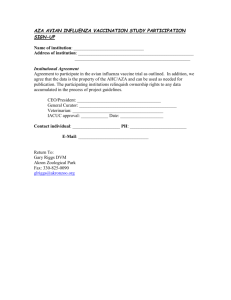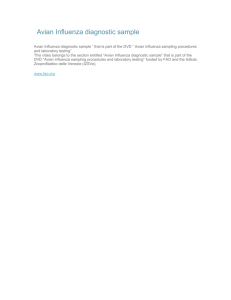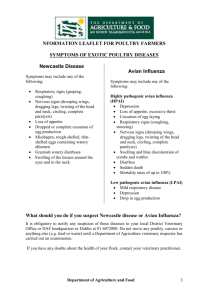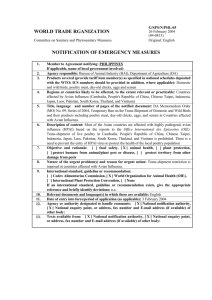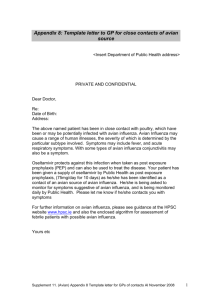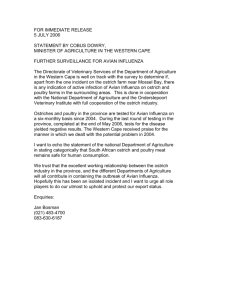Delhi-Declaration
advertisement
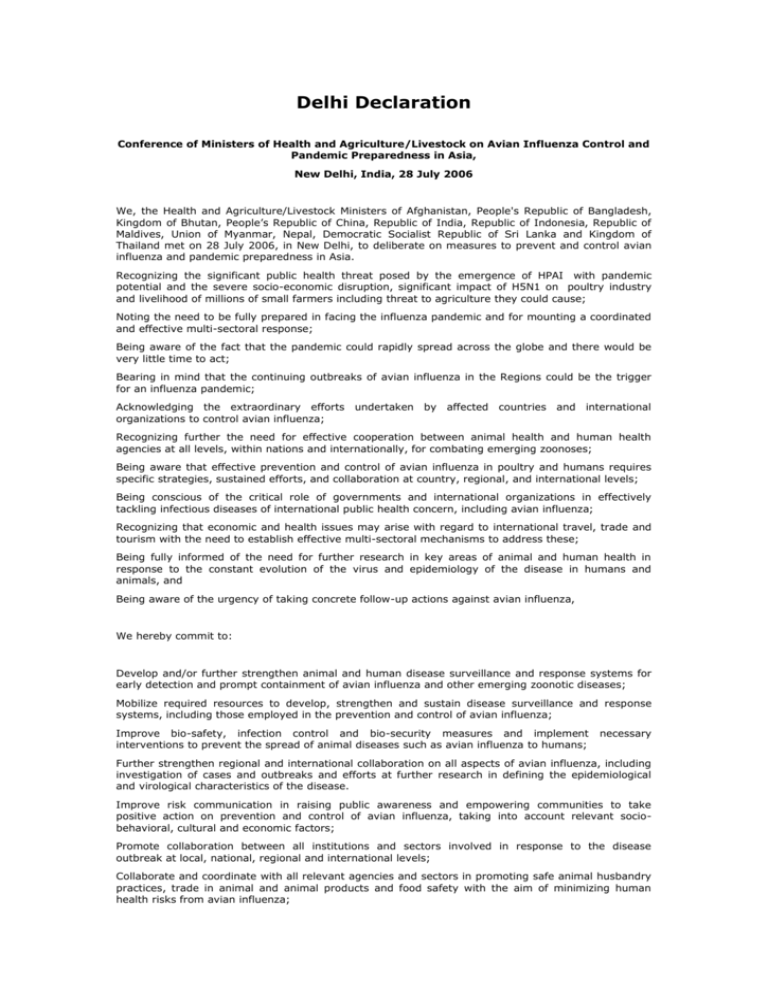
Delhi Declaration Conference of Ministers of Health and Agriculture/Livestock on Avian Influenza Control and Pandemic Preparedness in Asia, New Delhi, India, 28 July 2006 We, the Health and Agriculture/Livestock Ministers of Afghanistan, People's Republic of Bangladesh, Kingdom of Bhutan, People’s Republic of China, Republic of India, Republic of Indonesia, Republic of Maldives, Union of Myanmar, Nepal, Democratic Socialist Republic of Sri Lanka and Kingdom of Thailand met on 28 July 2006, in New Delhi, to deliberate on measures to prevent and control avian influenza and pandemic preparedness in Asia. Recognizing the significant public health threat posed by the emergence of HPAI with pandemic potential and the severe socio-economic disruption, significant impact of H5N1 on poultry industry and livelihood of millions of small farmers including threat to agriculture they could cause; Noting the need to be fully prepared in facing the influenza pandemic and for mounting a coordinated and effective multi-sectoral response; Being aware of the fact that the pandemic could rapidly spread across the globe and there would be very little time to act; Bearing in mind that the continuing outbreaks of avian influenza in the Regions could be the trigger for an influenza pandemic; Acknowledging the extraordinary efforts undertaken by affected countries and international organizations to control avian influenza; Recognizing further the need for effective cooperation between animal health and human health agencies at all levels, within nations and internationally, for combating emerging zoonoses; Being aware that effective prevention and control of avian influenza in poultry and humans requires specific strategies, sustained efforts, and collaboration at country, regional, and international levels; Being conscious of the critical role of governments and international organizations in effectively tackling infectious diseases of international public health concern, including avian influenza; Recognizing that economic and health issues may arise with regard to international travel, trade and tourism with the need to establish effective multi-sectoral mechanisms to address these; Being fully informed of the need for further research in key areas of animal and human health in response to the constant evolution of the virus and epidemiology of the disease in humans and animals, and Being aware of the urgency of taking concrete follow-up actions against avian influenza, We hereby commit to: Develop and/or further strengthen animal and human disease surveillance and response systems for early detection and prompt containment of avian influenza and other emerging zoonotic diseases; Mobilize required resources to develop, strengthen and sustain disease surveillance and response systems, including those employed in the prevention and control of avian influenza; Improve bio-safety, infection control and bio-security measures and implement interventions to prevent the spread of animal diseases such as avian influenza to humans; necessary Further strengthen regional and international collaboration on all aspects of avian influenza, including investigation of cases and outbreaks and efforts at further research in defining the epidemiological and virological characteristics of the disease. Improve risk communication in raising public awareness and empowering communities to take positive action on prevention and control of avian influenza, taking into account relevant sociobehavioral, cultural and economic factors; Promote collaboration between all institutions and sectors involved in response to the disease outbreak at local, national, regional and international levels; Collaborate and coordinate with all relevant agencies and sectors in promoting safe animal husbandry practices, trade in animal and animal products and food safety with the aim of minimizing human health risks from avian influenza; Facilitate prompt and open exchange of information on avian influenza between and among countries and with concerned international agencies to ensure transparency in reporting and facilitate consultation on health-related measures of international concern, especially during disease outbreaks; Further strengthen and harmonize activities related to all important aspects of avian influenza, both in animals and humans, including surveillance, investigation of suspected cases, collection of specimens, laboratory support and characterization of the virus; determining the epidemiological aspects of the disease, and defining appropriate public health responses and other interventions such as appropriate compensation mechanisms; Develop a mechanism for inter-country and interregional collaboration in outbreak investigation and containment, information dissemination, and strengthening each other’s capacity in responding to avian influenza and other emerging infectious diseases; Take necessary steps to update and implement effective national influenza pandemic preparedness plans involving all the sectors and stakeholders in the planning and implementation process; Voluntarily adopt the relevant articles of the International Health Regulations and suitable national regulatory framework as a measure of preparedness for influenza pandemic; Collaborate in efforts to develop and produce drugs, vaccines and diagnostic tests for avian and pandemic influenza and promote other appropriate research activities; In view of the aforementioned, we the Ministers recognizing the importance of regional initiatives, hereby recommend our governments and the existing regional fora in Asia, such as, ASEAN and SAARC along with the World Health Organization(WHO), the Food and Agriculture Organization(FAO) and the World Organization for Animal Health(OIE) in collaboration with other relevant international organizations to: 1. 2. 3. 4. Develop a common framework within which countries could build specific strategies for prevention and control of avian Influenza and to be prepared for pandemic influenza threat. Define uniform standards and monitor their implementation for reducing the risk of HPAI infection to humans by appropriate control measures of its outbreaks in poultry and other animals. Share available knowledge and expertise and also take leadership in the respective regions in surveillance and outbreak investigation, laboratory support, risk communication and research, and Further intensify efforts to make sufficient resources available to address this public health threat.
